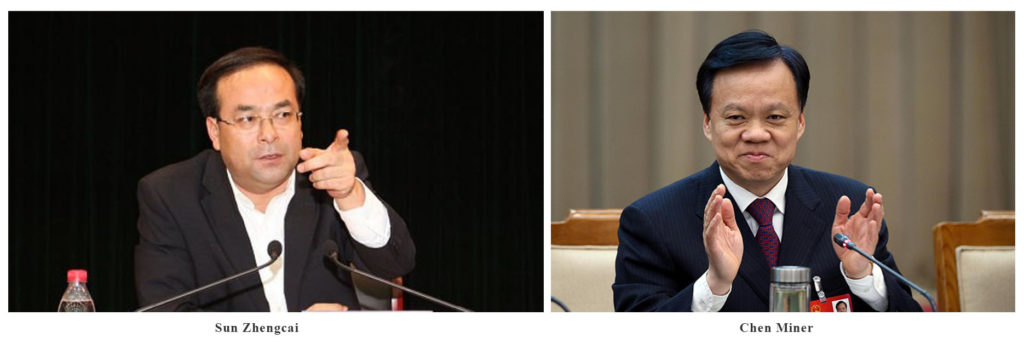
Five years after Bo Xilai, once the high-flying and charismatic party chief of Chongqing municipality was expelled from the communist Party and eventually sentenced to life imprisonment, his successor Sun Zhengai is currently under the investigation.
In a tale of telling similarities, Sun, like Bo was being widely seen as a strong contender for the Politburo Standing Committee, the party’s innermost circle of decision-making authority before their ouster. In Bo’s case what appeared to be his biggest mistake that attributed to his downfall was his connection with then security czar and now disgraced Zhou Yongkang and his unscrupulous handling of the infamous Wang Lijun case. However, speculations are still rife on Sun’s fall from grace as one of the contenders for top leadership in China.
After Bo’s scandalous exit from political scene, Zhang Dejiang stepped in as replacement to become party secretary of Chongqing municipality. Zhang’s tenure was short lived as Sun Zhengcai, one of the two youngest rising six-generation leaders in the 25-member strong Politburo, replaced him.
A closer look at the transition that began from Bo’s downfall to the just ensnared Sun, certainly begets a simple question – is Sun’s investigation related to a power struggle? This simple question not only concerns Bo and Sun, but also encompasses other top leaders who have been expelled from the party over the decades. Bo and Sun are third and fourth in the line of fallen incumbent politburo members who concurrently held significant party portfolios. The other two were former Beijing party boss Chen Xitong and former Shanghai party boss Chen Liangyu who were purged in 1995 and 2006 respectively.
To have a nuanced understanding of the context of this question requires a little bit of historical background. Since its founding, China’s top leaders’ infighting for unassailable power is an indelible blot in the history of the Chinese Communist Party. A case in point was the mysterious death of Lin Biao, a marshal who stood along with Mao Zedong in the communist party’s formative years, interpreted as an infamous power struggle between the two. In addition, the deep running rot of corruption within the party ranks since the late 1980s has added to the party’s fragility. The combination of power struggle among the top leaders with the proliferation of corruption within the party has seriously challenged the communist party’s validity.
Unlike Bo, Sun has no record of factional affiliation. However, he was known to be a protégé of Wen Jiabao, China’s former premier and received promotions riding on Wen’s coattail, most notably as the party secretary of Jilin province and agriculture minister prior to his Chongqing appointment. Since Sun’s appointment as the secretary of the Chongqing municipality party committee, the Central Discipline Inspection Committee headed by Wang Qishan, one of the most trusted allies of Xi Jinping, has often admonished for his poor and incompetent governance.
As reported in Chinascope, Chongqing municipal committee has held 11 important meetings since July 15 this year, the day when Chen Miner, former Guizhou provincial party secretary, took over as the party secretary of Chongqing municipality. Chen is currently in the party’s Central Committee as a full member and known to be one of Xi’s most loyal deputies in the upper echelon of the CCP. Issues that were discussed at the meetings indicate Sun’s failure to eliminate the pernicious legacy of Bo and Wang Lijun, former police chief of Chongqing and could have contributed to his investigation by the party’s discipline watchdog.
But, it remains to be seen whether Sun will meet the same fate as his predecessor, Bo. Zhang Lifan, Beijing-based political commentator, told the South China Morning Post that “Sun might be given a lightweight post, but there is no reason to take him down as he has not made any big mistakes yet. He added that any decision would also have to consider saving face for Wen Jiabao”.
However, the underlying story of this latest fiasco reveals the more important reality of Xi’s marauding force in consolidating absolute power ahead of the 19th party congress. In Xi’s own long march towards imperious helmsmanship, Sun could well be just another sacrificial lamb and his replacement Chen, a pawn to steer the influential Chongqing seat.
___________
*Tenzin Tseten is a research fellow at the Tibet Policy Institute. Views expressed here do not necessarily reflect those of the Tibet Policy Institute.
